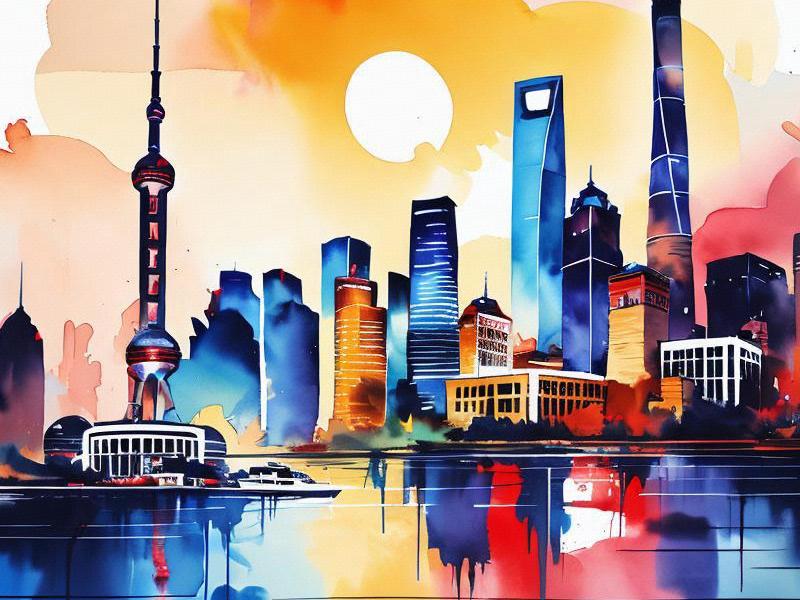Shanghai, a vibrant city on the eastern coast of China, has long been a symbol of China's rapid economic growth and modernization. As one of the world's most dynamic metropolises, Shanghai is not only a hub for international trade and finance but also a melting pot of diverse cultures, a cradle of innovation, and a city that continuously redefines itself in the face of the future.

Shanghai's history dates back to ancient times, but it was during the 19th century that the city began to take on its modern form. The opening of treaty ports after the First Opium War brought an influx of foreign influence, leading to the construction of iconic buildings like the Bund and the French Concession. These areas, with their blend of European and Chinese architectural styles, stand as a testament to Shanghai's unique historical heritage.
In the 20th century, Shanghai became known as the "Paris of the East," a cosmopolitan center of commerce, culture, and nightlife. Despite the turbulence of war and political change, the city's spirit of resilience and innovation never wavered. Today, Shanghai is a global financial center, ranking alongside New York and London in terms of economic influence.
One of the most striking aspects of Shanghai is its urban development. The city has undergone a remarkable transformation over the past few decades, with skyscrapers piercing the skyline and modern infrastructure connecting its various districts. The iconic Oriental Pearl Tower and the futuristic Shanghai Tower are just two examples of the architectural marvels that define the city's skyline.
The Pudong area, once a rural region, has been transformed into a symbol of China's economic reform and opening up. Home to the Lujiazui Financial District, Pudong is a hub for international businesses and a showcase of modern urban planning. The Jin Mao Tower, the Shanghai World Financial Center, and the Shanghai Tower, all located in Pudong, are among the tallest buildings in the world and attract millions of visitors each year.
夜上海最新论坛 Shanghai's economy is diverse and robust, with key industries including finance, trade, manufacturing, technology, and tourism. The city is a major center for international trade, hosting the China International Import Expo (CIIE) annually, which highlights China's commitment to opening up its market to the world. Shanghai's financial district is home to some of the largest banks and financial institutions in Asia, making it a key player in the global economy.
Technology and innovation are at the heart of Shanghai's development strategy. The city has established itself as a leading hub for high-tech industries, with a strong focus on artificial intelligence, biotechnology, and green energy. Zhangjiang Hi-Tech Park, one of the largest technology parks in China, is home to numerous startups and research institutions, fostering a vibrant innovation ecosystem.
Culturally, Shanghai is a city of contrasts and harmonies. The Bund, with its historic buildings and stunning views of the Huangpu River, offers a glimpse into the city's colonial past. The French Concession, with its charming streets and cafes, provides a relaxing escape from the hustle and bustle of modern life. Meanwhile, the vibrant Shanghai Museum and the China Art Museum showcase the rich cultural heritage of the city and the country.
Shanghai's culinary scene is another aspect that reflects its diverse cultural influences. From traditional Shanghainese dishes like xiaolongbao (soup dumplings) and shengjianbao (pan-fried buns) to international cuisines, the city offers a feast for the senses. The bustling night markets and food streets are popular gathering spots for locals and tourists alike, showcasing the city's culinary diversity.
上海水磨外卖工作室
Education is a key focus of Shanghai's development, with the city boasting some of the best universities and research institutions in China. Fudan University and Tongji University are among the most prestigious institutions, attracting students from around the world. Shanghai's commitment to education and research has contributed to its reputation as a center of knowledge and innovation.
Sustainability and environmental protection are also central to Shanghai's urban planning. The city has implemented various initiatives to reduce pollution, promote green energy, and improve public transportation. The Maglev train, which connects Pudong International Airport to the city center, is a prime example of Shanghai's commitment to sustainable transportation.
Tourism is a significant contributor to Shanghai's economy, with millions of visitors drawn to the city's rich history, modern attractions, and vibrant culture. The Yu Garden, the Nanjing Road shopping street, and the Shanghai Disneyland are just a few of the popular destinations that showcase the city's charm and diversity.
上海娱乐联盟 Shanghai's global influence extends beyond its economic and cultural achievements. The city plays a key role in international diplomacy and cooperation, hosting numerous global events and summits. The G20 Summit, the Belt and Road Forum, and the CIIE are just a few examples of the high-profile events that have been held in Shanghai, highlighting the city's importance on the world stage.
As Shanghai continues to grow and evolve, it faces challenges such as urbanization, environmental sustainability, and social inequality. However, the city's innovative spirit and commitment to progress ensure that it remains a beacon of hope and opportunity for its residents and a model for other cities around the world.
In conclusion, Shanghai is a dynamic metropolis that embodies the spirit of China's modernization and global integration. With its rich history, vibrant culture, robust economy, and commitment to innovation and sustainability, Shanghai continues to inspire and captivate the world. As the city looks to the future, it remains a symbol of what is possible when tradition meets progress and diversity thrives in harmony.